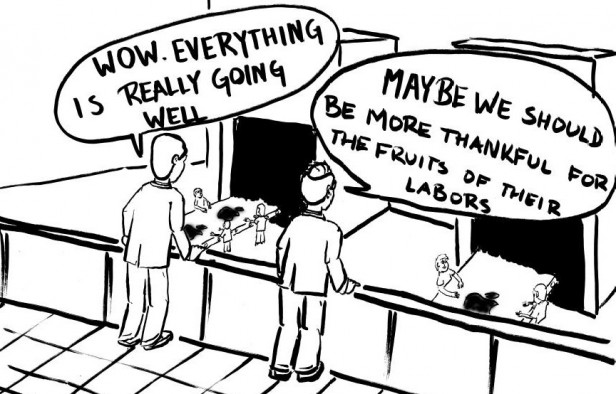Apple has a reputation for being clean: clean designs, clean computers, and up until now, a relatively clean reputation. But the company’s recent reports have exposed its suppliers’ failure to adhere to Apple’s standards for working conditions.

The factories under attack are owned by Foxconn, a billion-dollar electronics manufacturer and one of Apple’s primary suppliers. The infractions included underage workers, crowded living quarters and long, unbroken work periods. China’s labor laws, which are much more lax than those in the U.S., make these issues difficult for Apple to resolve.
Many consumers were shocked by these revelations, and Apple’s labor reports acknowledged widespread labor policy violations. Online petitions calling for reform racked up thousands of signatures. In response, Apple has begun independent inspections of its factories, and Foxconn has announced it will raise wages and cut work hours.
Apple should hold itself responsible to independent auditors and demand that Foxconn make the necessary reforms to its factories. Admittedly, managing the overseas factories of a company as large as Apple is complicated, and Apple has made clear that it doesn’t condone these practices. Yet neither the company nor the consumers can afford to brush these reports aside.
Workers at a Shenzhen Foxconn factory earn only $1.78 an hour, according to a Februrary Nightline report. Apple itself reported that only 38 percent of its management systems complied with the company’s working hour standards in 2011. In one instance, managers of Foxconn woke their workers up in the middle of the night mere weeks before the iPhone’s release upon Steve Jobs’ demand that iPhone screen covers be glass instead of plastic, according to the New York Times. Without these workers, products like the iPhone wouldn’t exist, and their hard work deserves respect – and fair compensation.
In 2010, Foxconn hired psychologists after a rash of worker suicides. Their prescription? Safety nets to prevent workers from jumping to their deaths. Rather than using primitive physical barriers as deterrents, Foxconn and Apple should focus on making tangible improvements to the quality of their employees’ lives.
This year, Apple released a supplier responsibility report outlining suppliers’ abuses and its responses. In addition, it requested that Fair Labor Association, an independent protective organization that safeguards workers’ rights, carry out inspections of its factories. The results of the inspection will be made public. Apple deserves praise for its efforts to increase transparency, but the audits are only the first step. Apple needs to make real, permanent changes in its factories and not just pay lip service to the idea of change.
The ultimate question is how the revelations about Foxconn labor conditions will affect consumers. Have we, in the clamor to acquire the latest iProduct, inadvertently encouraged this kind of exploitation from corporations racing to keep up with the enormous demand from customers? Politicians hold Steve Jobs’ creation as the shining beacon of American innovation, but Apple tarnishes this reputation by failing to enforce basic labor standards and fostering a dangerous working environment. Apple’s loyal fans should implore the company to adopt a greater role in overseeing its factories and ask the mega-corporation to address the problems brought to light by the Foxconn investigation with solutions that are as innovative as Apple products themselves.










CM Punk • May 5, 2012 at 2:25 pm
The “This American Life” story that brought up these issues was pulled because the journalist that wrote and presented this story fabricated parts of his trip. So just take this with a grain of salt.
Anon • Mar 15, 2012 at 10:55 am
Yeah, a lot of products that have “Made in China” on them were made with workers whose living conditions are that of slaves.
Anonymous • Mar 7, 2012 at 10:11 am
It’s not just Apple. It’s every big company that’s doing this.